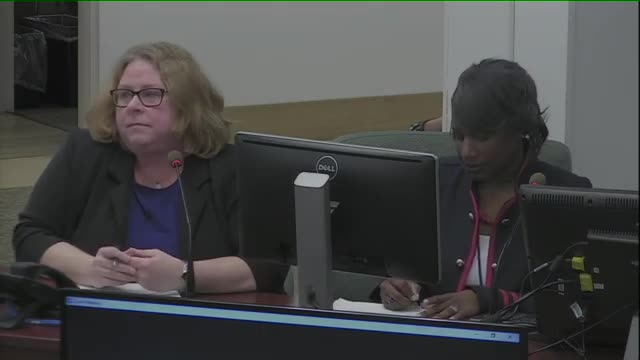State Launch Year Project reevaluates Algebra 2 curriculum for relevancy
February 27, 2024 | Maryland Department of Education, School Boards, Maryland

This article was created by AI summarizing key points discussed. AI makes mistakes, so for full details and context, please refer to the video of the full meeting. Please report any errors so we can fix them. Report an error »

In a pivotal meeting held on February 27, 2024, the Maryland State Board of Education gathered to discuss pressing educational reforms and strategies aimed at enhancing student learning across the state. The atmosphere was charged with a sense of urgency and collaboration as board members and educators shared insights and experiences from their respective local education agencies (LEAs).
One of the key discussions centered around the need for best practices in LEAs, particularly for those struggling with individualized student attention. A board member emphasized the importance of developing and sharing effective models that could serve as a guide for other districts facing similar challenges. “Having some good models to share would be useful,” they noted, highlighting the collective responsibility to support all students.
The conversation then shifted to the ongoing "Launch Years" project, which aims to revamp the state’s math curriculum. A board member, who identified as a mathematician, expressed enthusiasm for the initiative, particularly regarding the re-evaluation of the Algebra 2 curriculum. “Are we looking at Algebra 2 and rethinking what ought to be in that course?” they inquired. The response was affirmative, with assurances that the group was indeed considering moving some content from Algebra 2 to Algebra 1, reflecting the evolving needs of students in today’s data-driven world.
The board acknowledged that certain outdated elements of the curriculum needed to be replaced with more relevant topics, such as data analysis. This shift aims to equip students with skills that are increasingly vital in modern society. “The world has evolved, and what’s needed in mathematics has evolved,” the board member remarked, signaling a commitment to keeping education aligned with contemporary demands.
As the meeting progressed, reflections on past inequities in the education system emerged. A member shared personal experiences of navigating embedded tracking and inequities as a student, underscoring the importance of equitable access to quality education for all students, particularly those from marginalized backgrounds. This poignant reminder of the systemic challenges faced by many students added depth to the discussions, reinforcing the board's commitment to fostering an inclusive educational environment.
The meeting concluded with a sense of optimism and determination. Board members expressed gratitude for the collaborative efforts that have brought them to this point, while also acknowledging the work that lies ahead. As Maryland continues to navigate the complexities of educational reform, the insights shared during this meeting will undoubtedly play a crucial role in shaping the future of the state's education system.
One of the key discussions centered around the need for best practices in LEAs, particularly for those struggling with individualized student attention. A board member emphasized the importance of developing and sharing effective models that could serve as a guide for other districts facing similar challenges. “Having some good models to share would be useful,” they noted, highlighting the collective responsibility to support all students.
The conversation then shifted to the ongoing "Launch Years" project, which aims to revamp the state’s math curriculum. A board member, who identified as a mathematician, expressed enthusiasm for the initiative, particularly regarding the re-evaluation of the Algebra 2 curriculum. “Are we looking at Algebra 2 and rethinking what ought to be in that course?” they inquired. The response was affirmative, with assurances that the group was indeed considering moving some content from Algebra 2 to Algebra 1, reflecting the evolving needs of students in today’s data-driven world.
The board acknowledged that certain outdated elements of the curriculum needed to be replaced with more relevant topics, such as data analysis. This shift aims to equip students with skills that are increasingly vital in modern society. “The world has evolved, and what’s needed in mathematics has evolved,” the board member remarked, signaling a commitment to keeping education aligned with contemporary demands.
As the meeting progressed, reflections on past inequities in the education system emerged. A member shared personal experiences of navigating embedded tracking and inequities as a student, underscoring the importance of equitable access to quality education for all students, particularly those from marginalized backgrounds. This poignant reminder of the systemic challenges faced by many students added depth to the discussions, reinforcing the board's commitment to fostering an inclusive educational environment.
The meeting concluded with a sense of optimism and determination. Board members expressed gratitude for the collaborative efforts that have brought them to this point, while also acknowledging the work that lies ahead. As Maryland continues to navigate the complexities of educational reform, the insights shared during this meeting will undoubtedly play a crucial role in shaping the future of the state's education system.
View full meeting
This article is based on a recent meeting—watch the full video and explore the complete transcript for deeper insights into the discussion.
View full meeting
